The best Internet search engines. Internet search engine – this special programs for searches installed on a whole range of specialized machines. And in a simple way - this is the same site with a set of programs, only on a special search engine (server). It is with the help of search engines that you find all the information you need. There are a lot of search engines.
1. What is an Internet Search Engine
2. Popular search engines in our country
3. Popular search engines Abroad
4. Fancy search engines
5. How to search for information on the Internet
The most best nsearch systems in our country:
http://www.yandex.ru

http://www.google.com

http://www.aport.ru

http://www.rambler.ru/

http://go.mail.ru

http://www.webalta.ru/
The most unloved and intrusive search engine.
Popular search engines abroad
http://www.altavista.com
http://www.alltheweb.com
http: // www. bing.com
http://www.google.com
http://www.excite.com
http://www.lycos.com
http://www.mamma.com
http://www.yahoo.com
http://www.dmoz.com
http://www.hotbot.com
http://www.dogpile.com
http://www.netscape.com
http://www.msn.com
http://www.webcrawler.com
http://www.jayde.com
http://www.aol.com
http://www.euroseek.com
http://www.teoma.com
http://www.about.com
http://www.ixquick.com
http://www.lookle.com
http://www.metaeureka.com
http://www.searchspot.com
http://www.slider.com
http://www.allthesites.com
http://www.clickey.com
http://www.galaxy.com
http://brainysearch.com
http://www.orura.com
Each country has its own popular search engines.
Fancy Search Engines
- Duckucko go (https://duckduckgo.com/)- a hybrid search engine with a privacy policy for the user and his search queries.
![]()
- Tineye (http://tineye.com/) - A search engine specializing in finding images on the Internet. Recently, it has lost its relevance after Google introduced the same function in its image search.
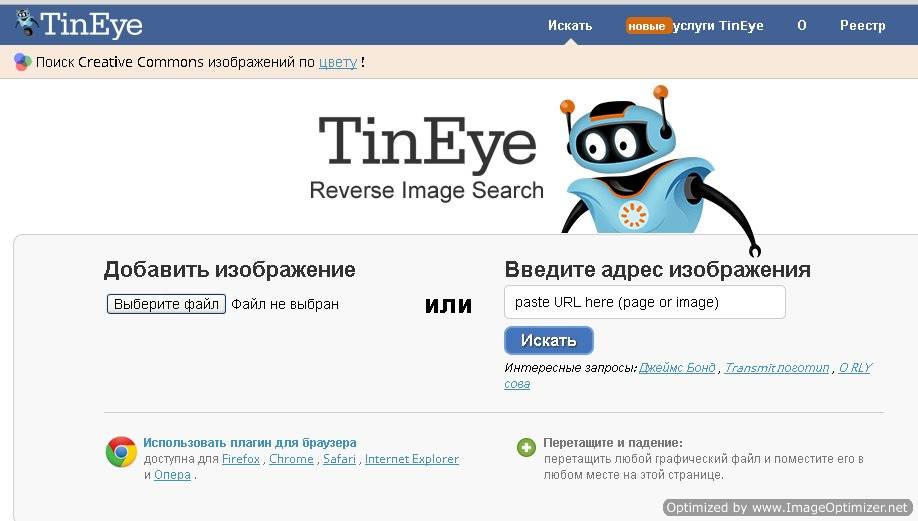
- Guenon (http://www.genon.ru/) - a search engine that collects and creates content on its website.

In almost every search engine, in addition to the search box, links to the most popular news sites, and sites of a certain subject.
How to search for information on the Internet
Each search system has its own algorithms (rules) for finding information.
In order to find some information on the Internet through a search engine, you must enter in the search field request. If you enter a single word, then you will be given thousands of links to sites that mention this word.
Therefore, you must enter as specific a query as possible, consisting of two, three or more phrases.
Let's look at an example search query Yandex.
Suppose you want to find information on buying a computer. If you write in the search box one word " Computer", Then you will be given 133 million answers

We need to ask a more specific request. It is better to indicate which computer you want to buy and where (in which city).

Then the search engine will give you much less answers to your request.
The search engine does not care what letters you enter the query - large or small.
Yandex distinguishes between nouns and adjectives, but completely ignores the endings.
He is also completely indifferent to cases plural etc.
In order to make the search more accurate, it is necessary to quote the query or put an exclamation mark before the word.

Now look at the same query, but without exclamation points.

See the difference? With exclamation marks, the number of answers is not 2 million, but 186 thousand.
If you put an exclamation mark in front of the word with a capital letter, then you will be given answers in which this word is found with a capital letter.
If the word is in the nominative case, and you need information on just such a word, and exactly the way you wrote it, then put two exclamation points in front of this word. For example: !!Ball .
The search will give you answers for exactly this word " Ball "The way you wrote it. Not " ball ", not " balls ", And with a capital letter.
If you write a phrase with the word " on "Then Yandex will ignore" on ". For example: " on the shelf ". The search will be performed only for the word " shelf ».
In order for him to take it into account and not ignore it, it is necessary before the word “ on "Put a plus sign -" + on ».
Each search engine has its own search algorithm, so if you use a specific search engine and want to learn how to make queries correctly, you just need to type in search bar « search rules inGoogle " or " yandex search rules », Follow the link to the response to your request and read the necessary information.
As you probably already know, the general method of using search engines is quite simple: I went to the search engine website, entered the search word (phrase), clicked on “Enter” (or the “Find” button) - get the result - a list of links to the Internet pages containing the word or phrase you specified.
The difficulty lies in the details, which are actually important: how to avoid the "heap of garbage" in the search results; how to make the search engine find the exact mention of the word (phrase) you need, and not all references in a row on all Internet sites; why in the list of found resources the most necessary and interesting sites are far from the first place. And also why the search engine did not find anything useful at all, although you know for sure that this information There is on the Internet, and a few dozen more “why?” and “how?”.
Earlier it was said that the best and most used Russian search sites are Google (Google), Yandex (Yandex), [email protected], Rambler (Rambler). The best foreign search engines are www.Google.com and www.yahoo.com. It should be borne in mind that all these search engines have their own individual characteristics.
To begin with, their “coverage areas” may differ - Internet spaces that are indexed by search engines, that is, they are studied, and on which the search is performed.
- Search engines usually consist of three components:
- programs - a robot (spider) that moves around the network and collects information about its resources;
- a database that contains information about network resources collected by a search robot;
- a search engine for user interaction with the database.
Spider crawlers, during their wanderings through the network, extract and index (evaluate) various types of information. Moreover, various robotic programs have their own search features and priorities. Some of them index each word in the document, others are only the most frequently occurring words. In general, indexing a document is done in many ways: by the number of words in the document, by the size of the document, by its name, headings, links, etc.
Typically, search robots work on a tip, that is, the creator of a web page writes a request to the search engine with a request to index his document. A search robot is sent to the specified URL and does its job.
But search engine spiders can also independently navigate the network by clicking on the links in the visited documents.
Robots put the collected information into a database with which the user interacts, performing a search. Each search engine produces its own database, while most of the information in it may be the same as that of other search engines, but there are significant differences.
Of no small importance is the way the search engine sorts the results found (placing some web pages at the top of the list and others at the end).
Updated: July 28, 2017
Hello dear readers of the blog site. , then its few users had enough of their own bookmarks. However, as you remember, it happened exponentially, and very soon it became more difficult to navigate in all its diversity.
Then catalogs appeared (Yahu, Dmoz and others), in which their authors added and sorted various sites into categories. This immediately made life easier for the then-not-so-numerous users of the global network. Many of these directories are still alive.
But after a while the sizes of their databases became so large that the developers first thought about creating a search inside them, and then about creating automated system indexing all Internet content to make it accessible to everyone.
The main search engines of the Russian-speaking segment of the Internet
As you know, this idea was realized with overwhelming success, but, it’s true, everything went well only for a handful of selected companies that managed not to disappear on the Internet. Almost all the search engines that appeared on the first wave, now either disappeared, or vegetate, or were bought by more successful competitors.
The search system is a very complex and, importantly, very resource-intensive mechanism (not only material resources, but also human resources). Behind the seemingly simple, or its ascetic counterpart from Google, are thousands of employees, hundreds of thousands of servers and many billions of investments, which are necessary for this machine to continue to work and remain competitive.
To enter this market now and start from scratch is more of a utopia than a real business project. For example, one of the richest Microsoft corporations in the world for decades has been trying to gain a foothold in the search market, and only now their search engine Bing is beginning to slowly meet their expectations. And before that there was a whole series of failures and setbacks.
What can we say about entering this market without any special financial influences. For example, our domestic search engine Nigma has a lot of useful and innovative in its arsenal, but their attendance is thousands of times inferior to the leaders of the Russian market. For example, look at the daily audience of Yandex:
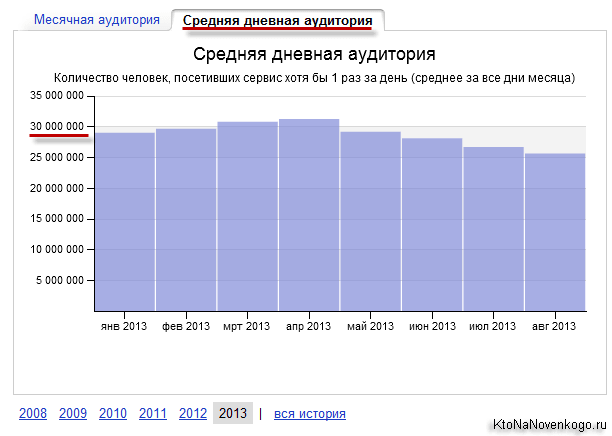
In this regard, we can assume that the list of the main (best and most successful) search engines for Runet and the entire Internet has already been formed and the whole intrigue is only about who will eventually gobble up whom, well, or how their percentage will be distributed if they all survive and stay afloat.
Search Engine Market in Russia it is very well visible and here, probably, two or three main players and a couple of minor ones can be distinguished. In general, a rather unique situation has developed in RuNet, which, as I understand it, was repeated only in two more countries in the world.
I say that google search engineHaving come to Russia in 2004, he still has not been able to seize leadership. In fact, they tried to buy Yandex around this period, but something didn’t work out there and now “our Russia”, together with the Czech Republic and China, are the places where the almighty Google, if not defeated, then, in any case, met serious resistance.
In fact, see the current state of affairs among top search engines runetanyone can. It will be enough to insert this URL into the address bar of your browser:
Http://www.liveinternet.ru/stat/ru/searches.html?period\u003dmonth;total\u003dyes
The fact is that most of them use on their sites, and this URL allows you to see statistics of visitors from various search engines to all sites that belong to the RU domain zone.
After entering the given Url, you will see a picture that is not very attractive and presentable, but which reflects the essence of the matter well. Pay attention to the first five search engines from which sites in Russian receive traffic:
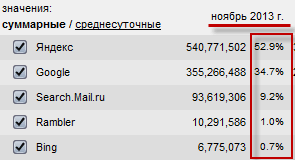
Yes, of course, not all resources with Russian-language content are located in this zone. There is also SU, and the Russian Federation, and the common areas such as COM or NET are full of Internet projects focused on runet, but nevertheless, the sample is quite representative.
This dependence can also be made more colorful, as, for example, someone on the network did for his presentation:
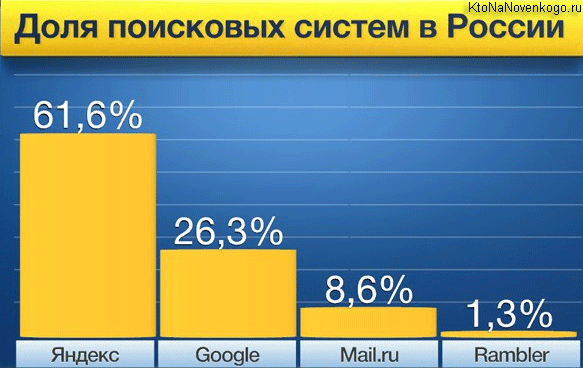
This does not change the essence. There are a couple of leaders and several very, very very lagging search engines. By the way, I already wrote about many of them. Sometimes it’s quite entertaining to plunge into a success story or, conversely, delve into the causes of the failures of once-promising search engines.
So, in order of importance for Russia and Runet in general, I will list them and give them brief characteristics:
The indexing process itself and the subsequent process of updating index databases are quite time-consuming. Although Google does it much faster than competitors, in any case Yandex, which requires a week or two for this matter (read about).
Typically, the text content of a web page is broken down by a search engine into individual words, which leads to basic fundamentalsso that later it would be possible to give the correct answers to the questions posed in different morphological forms. All the extra kit in the form Html tag, spaces, etc. things are deleted, and the remaining words are sorted alphabetically and next to them their position in this document is indicated.
Such a shnyaga is called a reverse index and allows you to search not by web pages, but by structured data located on the search engine servers.
The number of such servers at Yandex (which searches mainly only on Russian-language sites and a bit on Ukrainian and Turkish) is in the tens or even hundreds of thousands, and at Google (which searches in hundreds of languages) - millions.
Many servers have copies that serve both to increase the security of documents and help to increase the speed of processing a request (due to load balancing). Estimate the costs of maintaining this entire farm.
The user request will be sent by the load balancer to the server segment, which is least loaded now. Then, an analysis of the region is carried out, from where the user of the search engine sent his request, and his analysis is done morphologically. If a similar query was recently entered in the search line, then the user is pushed data from the cache so as not to load the server again.
If the request has not yet been cached, then it is transferred to the area where the search engine index database is located. In response, a list of all web pages that have at least some relevance to the request will be received. Not only direct occurrences are taken into account, but also other morphological forms, as well as synonyms, homonyms, etc. things.
Their need to be rankedand at this stage the algorithm (artificial intelligence) comes into play. In fact, the user’s request is propagated at the expense of all possible options its interpretations and simultaneously search for answers to many queries (through the use of query language operators, some of which are available to ordinary users).
As a rule, there is one page from each site in the search results (sometimes more). Now they are very complex and take into account many factors. In addition, for their correction are used and that manually evaluate reference sites, which allows you to adjust the operation of the algorithm as a whole.
In general, the matter is clear, that the matter is dark. You can talk about this for a long time, but it is also understood that user satisfaction with the search engine is achieved, oh, how hard it is. And there will always be those who don’t like something, such as, for example, dear readers.
Good luck to you! See you soon on the blog pages site How search engines work - snippets, reverse search algorithm, page indexing and features of Yandex
 How to check a site for broken links - Xenu Link Sleuth, a plugin and online service Broken Link Checker, as well as search engines
How to check a site for broken links - Xenu Link Sleuth, a plugin and online service Broken Link Checker, as well as search engines
 Electronic money of Russia and Runet, as well as wallets in international Paypal payment systems - what is it, registration, depositing funds and how to use it, as well as how to withdraw money from Paypal in Russia Bing webmaster - a center for webmasters from the Bing search system
Electronic money of Russia and Runet, as well as wallets in international Paypal payment systems - what is it, registration, depositing funds and how to use it, as well as how to withdraw money from Paypal in Russia Bing webmaster - a center for webmasters from the Bing search system
If you really understand something, then thoroughly. And if you are subscribed to our blog, then you probably want to become a cool specialist or want to know more about online searches. To achieve the desired - chips and life hacks are not enough. It is necessary to expand horizons.
Have you ever wondered how it appeared that we use every day, what search engines exist and why do all studios work only with Yandex and Google? Do not put off such questions in long box. Just 10 minutes and here is another topic for conversation that you can easily support.
How did search engines appear?
Once upon a time, when the Internet was young and green ...
Users, which, I must say, were very few, had enough of their own bookmarks. But this did not last long: soon it became difficult for a person to navigate in the variety that appeared on the network in a short time.
And in order to somehow regulate the chaos, Yahoo, DMOZ, and other directories were invented (some exist to this day), in which the authors added and sorted the categories of sites that appeared. For some time, life has become easier.
But the Internet continued to expand and soon the size of directories turned into something breathtakingly gigantic. Then the developers first thought about searching inside directories, and only then about creating an automated indexing system for everything on the Internet in order to simplify the work for all users.
So the first search robots appeared.
What was the first search engine?
The first search engine is consideredWandex (well, confused with Yandex!). This and other first services, of course, were far from perfect. On search query they did not give out at all what we used to see now, i.e. not the mostrelevant pages, and everything, ignoring the ranking. On the first of January 2012, Wandex was renewed.
So the first PS began its work.What are the search engines at modern internet? I am enclosing the list.
What are the search engines: kings of the dance floor
Surprisingly, there are those who arguehow a search engine is better. I would not do this, simply for the reason that they are different and in general it all depends on the goal and on which user you are.
Yandex
This is the most popular search engine in our country. LiveInternet claims thatYandex 50.9% use it, while Google accounts for 40.6% (data from June 2015).
There is such a myth, they say, there are many times more commercial queries on Yandex than on the nearest competitor. I came across a couple of times the thought that due to the regionality honed over the years, the type of audience or its number may vary - this is the reason for the primacy of Yandex for commercial inquiries. So do not believe in it. They lie.
Search engine google system - the most popular everywhere, except for Russia :) It has a bunch of possibilities of different directions. In general, the undisputed world leader among search robots.
Google itself appeared approximately along with Yandex, and only came to us in Russia in 2004, when Yandex strengthened its position.
The search process on Google has become a household word for many earthlings. But when I tell my mother “Zagugli”, she still goes to look for the information she needs in Yandex :) She doesn’t know at allwhat search engines exist on the Internet.
What are the search engines: a list of little-known PS
Most internet users don’t even knowwhat search engines are there besides Yandex and google. So there they are;) Meet!
The search share of this search engine can hardly be called large, but indicators are slowly growing. Although you should not miss the fact that these numbers directly depend on Odnoklassniki, Mail.ru and other items from Mail Corporation.

This is a real old school. Just imagine: when this search engine appeared, some SEOs were just learning to walk. In general, Rambler had a chance to rule the ball in Runet, but this did not happen for a number of reasons. Currently, this is not quite a search engine, but a kind of set of services that use the Yandex engine as a search. Attendance, by the way, is pretty decent: per day home page Rambler is visited by just over a million users.
Rambler also has a versionRambler Lite (all the same, only without weather, news, advertising, etc.) andXrambler , which immediately combines 15 search engines.

How many names did this search engine change! For 8 years, he managed to vilify the name MSN Search, then Windows live Search, then shortened the previous name to Live Search and now came to the name Bing. Many argue that search quality is close to Google’s standard.
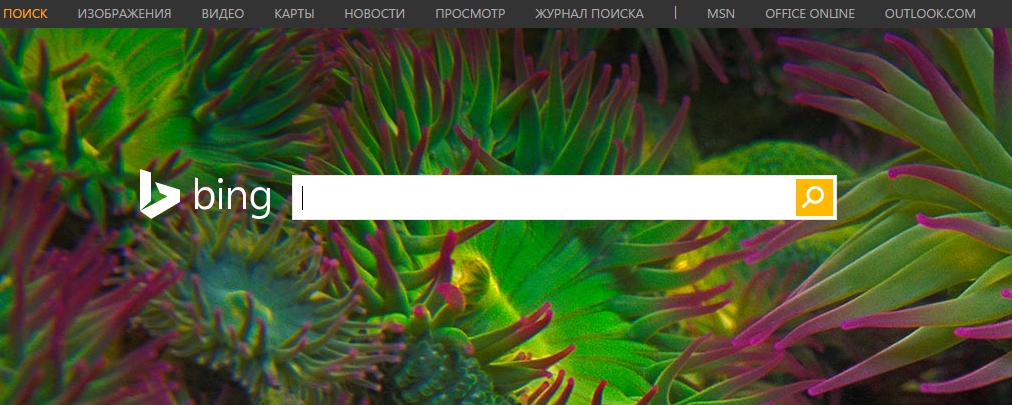
Now it’s difficult to call Yah a search engine, since by agreement on all sites belonging to Yah, Bing’s search engine is used. The latest news about the contract can be found onSearchengines.
Webalta
Surely this so-called search engine is familiar to you. Had to pick it out like a tick from your browser?For a long time, everyone knows about the dark affairs of this search engine. Alas, this PS does not interest anyone. Users only search for articles on how to remove this rubbish from their computer.
This search engine is significantly different from the rest. And if you can’t surprise anyone with the search filters and index base of other search engines, then the ability to solve problems in chemistry and mathematics distinguishes Nigma from other substations. Nigma also offers searches on music, books, games and torrents.
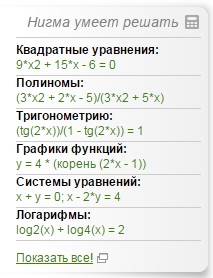
The search engine, commissioned by the Russian government, is considered the world's first state-owned search engine. It offers a separate medical search (search for pharmacies, medicines and articles about diseases). A very convenient topic with “Convenient country”, where in one place all the recommendations that help the citizen are collected. For example, the “Documents” section.

This PS is significantly different fromwhat are the search engines on the Internet. DuckDuckGo - Search Engine open source and interesting policy, which is to abandon the use of the "bubble of filters." For those who don’t know: “filter bubble” is when the search engine shows in the search results only those search results that it (this PS) considers necessary for a particular user. At the same time, the user’s opinion does not interest anyone. DuckDuckGo says that using their search engine ensures that you get all the information that a search engine has.
“Duck Duck Go” is gaining momentum. Already this summer (2015), the creator of the PS announced three billion requests in annual terms.
While writing this article, I had several questions. In such cases, I do not rely on extradition, yes, and why, if there is a person sitting next to me who knows everything about the Internet? Mini-interview with Igor Ivanov.

Igor Ivanov
Head of SEMANTICA Studio
If my site is in Google and Yandex TOP, will my site be at the top of the search results in other, smaller search engines?
There is a very high probability that this will be so. Yandex and Google are developing their algorithms in the right direction, and other search engines are taking an example from them. There was a case when Google experts noticed that the Bing search engine not only copies their algorithms, but the search results.
Why is probability, not full confidence? Because other search engines do not have time to adjust their ranking algorithms to the standard set by their more successful competitors.
Is it worth it to advance in Sputnik, Mile and other “our” search engines? Which search engine is better?
In Mail.ru, no doubt, it’s worth it. There is a little traffic, or rather it is very small, but it is - and these are customers. Satellite and other search engines are a myth, like social network “My world”, everyone knows that they exist, but no one saw them :)
Creating new search engines is a pretty utopian idea. Why do you think something new appears periodically?
Who owns the information, owns the world. See how many companies depend on search engines, and how many people do not know any alternatives? Who will refuse this? Any investment will be justified if you achieve a result.
And as a result of this - the loot, the huge loot, the endless income of the dough from the air, out of nothing ... Neither resources nor people are needed (I mean that you do not need a million trillion Indians who rummage through the encyclopedia for each user request).
AT currently search quality does not affect the number of users. Take Google, for example: in Russia it had about 30-35% of the audience, but it created the revolutionary Chrome browser and with it increased its audience at times.
I’m sure that a search engine even with modest technologies, but with some revolutionary approach to marketing can get an audience and squeeze out a part of the market.
a search engine like me? ” In general, everyone who is interested, welcome to the ranking of the most popular search engines in the world, Russia and the USA.At the time of March, April and June 2015, we can see such a picture in Runet. At the same time, it is worth noting that Yandex is confidently in the first place, Google is growing and taking the market, as predicted by analysts from Morgan Stanley. At the beginning of the year, their statistics said -2.8% for Yandex, and about + 5% for Google in Russia. If you look at the statistics from the counters collected by the Seo-auditor company, then since May 2014, the Google search engine has gained a little more than 6%, and Yandex has lost a little less than 3%.
THE MOST POPULAR SEARCH SYSTEMS IN RUSSIA AT THE MOMENT OF 2015 (APRIL - JUNE)
* at the time of 2015 (April)
Observing this trend, it is worth saying that Google is taking a huge share in Russia thanks to mobile devices, Yandex is trying to resist, but so far not very successfully. 
As you can see Mail.ru lost one sixth of the share of 2014, but now everything is stable. The search engine from Rambler tried to reorganize and even rose above 2%, but now I think there will be a gradual decrease. If you look at the future, the prospect will remain with Yandex and Google, but do not forget that there is another search engine that can come both Google and Yandex on the heels. A little later we will find out which system I’m talking about when it comes to search engines in the US and the world.
Let's look at the Liveinternet statistics for June 2015.
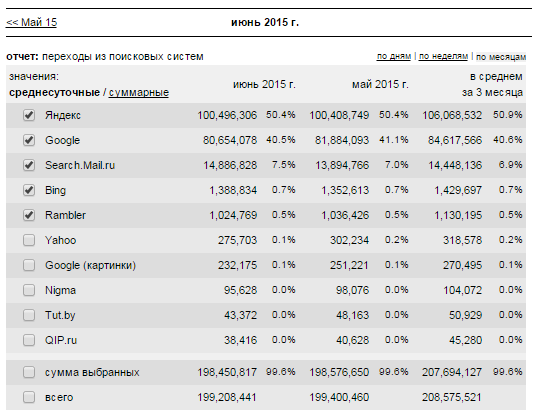
As we see the statistics are not much different from the graphs above: we see a slight strengthening of the positions of Yandex, Google’s and Mail.ru. As suggested by Bing, Russia is still in stagnation, and Rambler is again sent “to the next world” (by the way, it was once a popular search engine on the Russian Internet).
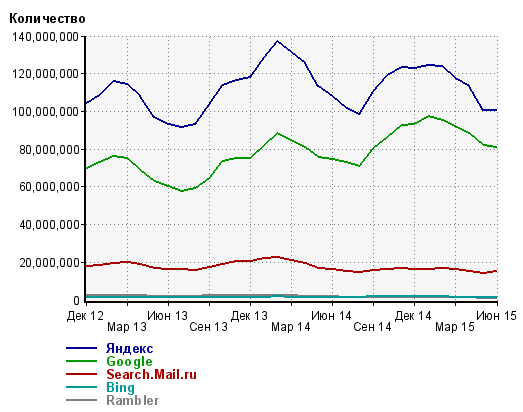
Dynamics of queries in popular search engines in Russia at the time of 2015 (June)
By the way, there are several conclusions on the topic of the development of search engines for SEO-optimizers. Google’s growth will continue and there are two significant factors:
- Generations from 10 to 16 years of age are more likely to use Google’s search engine, which means that after some time with the generational shift, Google’s audience will grow
- Following from the first argument, we see growth mobile devices, and there are already about 20-30% of the total traffic. Following from this, Google’s traffic will increase, since the popularity of this search engine in mobile is higher than that of Yandex. Do not forget such a factor as the Android OS ...
All this suggests that if the situation in the next three to four years (and maybe faster) does not change for the better for Yandex, Google will take the lead among the search engines in Russia. So, the SEO optimizer should optimize their sites not only for Yandex, but also for Google. It is better to look into the future and be prepared than to jump on the ship last. Perhaps our forecasts are subjective, but such are the statistics collected by analysts from.
THE MOST POPULAR SEARCH SYSTEMS IN THE USA AT THE MOMENT OF 2015
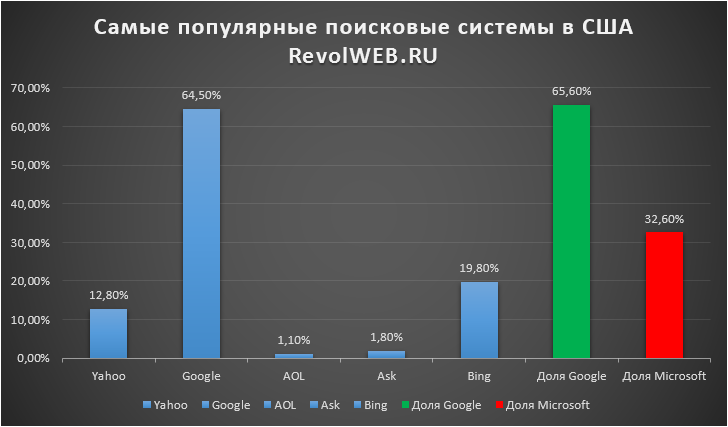
* at the time of 2015
The graphs show the search engines (namely sites): Google, Bing, Yahoo, Ask and AOL. On the right is the total share, because Yahoo is now allied with Bing, which means the total share of Microsoft's brainchild is about 33%. Google uses AOL and Google’s total market share of about 66%






